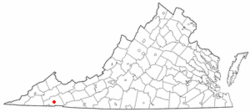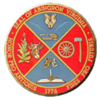Abingdon, Virginia
| Abingdon, Virginia | ||
|---|---|---|
| Town | ||

Abingdon Welcome Sign
|
||
|
||
| Motto: Honor Pro Antiquis, Fides Pro Futuris | ||
 Location in the Commonwealth of Virginia |
||
| Coordinates: 36°42′35″N 81°58′32″W / 36.70972°N 81.97556°WCoordinates: 36°42′35″N 81°58′32″W / 36.70972°N 81.97556°W | ||
| Country | United States | |
| State | Virginia | |
| County | Washington | |
| Founded | 1778 | |
| Government | ||
| • Mayor | Cathy Lowe | |
| Area | ||
| • Total | 8.3 sq mi (21.6 km2) | |
| • Land | 8.3 sq mi (21.6 km2) | |
| • Water | 0 sq mi (0 km2) | |
| Elevation | 2,087 ft (636 m) | |
| Population (2010) | ||
| • Total | 8,191 | |
| • Density | 932.6/sq mi (360.2/km2) | |
| Time zone | EST (UTC-5) | |
| • Summer (DST) | EDT (UTC-4) | |
| ZIP codes | 24210-24212 | |
| Area code(s) | 276 | |
| FIPS code | 51-00148 | |
| GNIS feature ID | 1498444 | |
| Website | www |
|
Abingdon is a town in Washington County, Virginia, United States, 133 miles (214 km) southwest of Roanoke. The population was 8,191 at the 2010 census. It is the county seat of Washington County and is a designated Virginia Historic Landmark. The town encompasses several historically significant sites and features a fine arts and crafts scene centered on the galleries and museums along Main Street.
Abingdon is part of the Kingsport−Bristol (TN)−Bristol (VA) Metropolitan Statistical Area, which is a component of the Johnson City−Kingsport−Bristol, TN-VA Combined Statistical Area − commonly known as the "Tri-Cities" region.
The region was long the territory of varying cultures of indigenous peoples, including the Chisca and Xualae. From the late 17th-century, it was occupied by the Cherokee Nation, whose territory extended from the present-day area of borders of Tennessee, Virginia, and Kentucky through the spine of North Carolina and later into Georgia.
Between 1748 and 1750, Dr. Thomas Walker surveyed the land where the town of Abingdon is situated. It was on the Great Road that Colonel William Byrd III ordered cut through the wilderness on to Kingsport, Tennessee. In 1760, the famed frontiersman Daniel Boone named the area Wolf Hills, after his dogs were attacked by a pack of wolves during a hunting expedition. The site of the attack is on 'Courthouse Hill'. In the twenty-first century, the town sponsored a public art event, in which artists created 27 wolf sculptures, which were installed around the town. Most were later sold at an auction to raise money for Advance Abingdon.
...
Wikipedia

